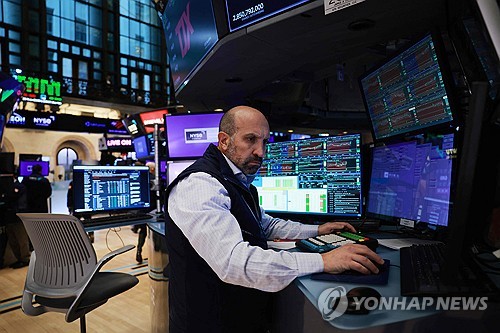
(New York=Yonhap Infomax) Jin Woo Choi—All three major U.S. stock indexes closed sharply lower as a wave of selling hit technology shares.
Markets initially surged on the back of Nvidia Corp.'s blockbuster earnings, but momentum quickly faded as renewed concerns over an artificial intelligence (AI) bubble weighed on sentiment.
Additional pressure came after a senior Federal Reserve official warned of heightened risks of a sharp correction in financial assets.
On November 20 (U.S. Eastern Time), the Dow Jones Industrial Average finished down 386.51 points, or 0.84%, at 45,752.26. The S&P 500 Index dropped 103.40 points, or 1.56%, to 6,538.76, while the Nasdaq Composite tumbled 486.18 points, or 2.16%, to close at 22,078.05.
The Philadelphia Semiconductor Index, which tracks AI and chip-related stocks, plunged 4.77%.
At the opening bell, New York stocks rallied on Nvidia's "big surprise" earnings. The Nasdaq rose as much as 2.58% intraday, the S&P 500 climbed 1.93%, and the Dow gained 1.56% at its peak.
Optimism was further fueled by the U.S. September jobs report, which raised expectations for a Federal Reserve rate cut. According to the U.S. Department of Labor, the unemployment rate in September ticked up 0.1 percentage point to 4.4% from the previous month.
As of 15:58 New York time, the CME FedWatch Tool showed a 39.6% probability that the Fed will cut rates by 25 basis points in December, up nearly 10 percentage points from the previous day's 30.1%.
However, around 11:00 a.m., the market reversed course sharply. Fears of an AI bubble resurfaced, triggering a broad sell-off in technology stocks.
A senior Fed official involved in rate decisions also voiced concerns. Fed Governor Lisa Cook said, "Our assessment is that valuations across several markets—including equities, corporate bonds, leveraged loans, and housing—are elevated relative to historical benchmarks." She added, "Currently, my impression is that the likelihood of a significant decline in asset prices has increased."
Matt Maley, chief market strategist at Miller Tabak, commented, "The market is questioning whether AI can deliver the earnings currently priced into stocks. Investors are worried whether today's massive AI investments will actually generate profits five years from now." He added, "That's why some are deciding to take profits now."
Some analysts argued that Nvidia's valuation is excessively high. Ross Seymore, analyst at Deutsche Bank, noted that even with an 85% revenue increase over the next two years, his $215 price target for Nvidia implies a price-to-earnings ratio (PER) of about 23 times.
Kimberly Forrest, Chief Investment Officer at Bokeh Capital Partners, said, "The increase in Nvidia's accounts receivable appears to be making investors uneasy. If products are selling so well, it's questionable why cash isn't coming in on time."
According to Nvidia's quarterly report, as of October 26 (end of Q3 fiscal 2026), accounts receivable stood at $33.4 billion, up 45% from $23.1 billion on January 26. This indicates a growing amount of unpaid receivables.
As market concerns mounted, the Nasdaq fell as much as 2.31% intraday, the S&P 500 dropped 1.63%, and the Dow slid 0.89%. The S&P 500 alone lost more than $2 trillion in market capitalization from its session high. Both the Dow and Nasdaq saw swings of over 1,000 points between their highs and lows.
By sector, only consumer staples (+1.11%) ended higher, while most others declined. Technology (-2.66%), consumer discretionary (-1.73%), industrials (-1.70%), materials (-1.62%), and communication services and energy (-1.07%) all fell by more than 1%.
Nvidia shares, which had surged more than 5% at one point, closed down 3.15%. Semiconductor stocks including Intel (-4.24%), Micron Technology (-10.87%), and AMD (-7.87%) all posted steep losses. Strategist also dropped 5.02% in tandem with a decline in Bitcoin prices.
Walmart Inc., which raised its annual earnings guidance, soared 6.46%.
The CBOE Volatility Index (VIX) jumped 2.76 points, or 11.67%, to 26.42.
jwchoi@yna.co.kr
(End)
Copyright © Yonhap Infomax Unauthorized reproduction and redistribution prohibited.

